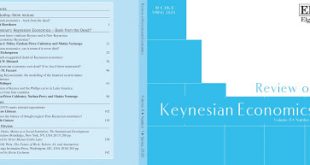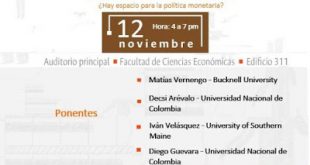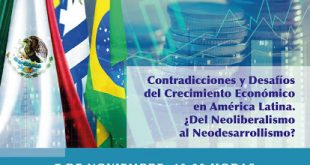[embedded content] Old clip from C-SPAN. It's still worth watching. Strong critique of the failures of the IMF and neoliberal policies in leading to the crisis. We know now that the subsequent bubble pushed the major crisis for another 10 years.
Read More »New Issue of ROKE soon!
The next issue of the Review of Keynesian Economics with Bob Rowthorn's Godley-Tobin Lecture and papers by Barry Eichengreen, Steve Fazzari, Peter Bofinger and Bob Dimand, among others is coming soon.
Read More »Heilbroner, Minsky and Heterodox Economics at UNAL Radio
Radio show in Spanish at the website of Universidad Nacional de Colombia. In Spanish of course. A short summary of one of my talks at the conference last week. Thanks to Diego Guerrero and Óscar Morillo.
Read More »The Moral Economy of Housing
A new post by David Fields, long time contributor to this blog. From his post: At its most fundamental level, housing is more than a market segment or policy, it is a social relation that serves as the kernel of human survival, which can have profound consequences for the actors involved, the actions they take, and the outcomes that follow. As such, housing provides a set of meanings and values, a material form of emotional, cultural, political and economic significance. It is an...
Read More »The effects of financialization in Latin America: Is there space for monetary policy?
For those in Bogota next Tuesday. I'll link to the live stream, which I think will be available.
Read More »Contradictions and Challenges for Growth in Latin America
This week, Thursday at 10am, at the Facultad de Estudios Superiores (FES) Acatlán, Mexico for those around. Organized by Teresa Santos López and with my good friend Ignacio Perrotini.
Read More »The IMF’s Second Chance in Argentina
Kevin Gallagher and Matías VernengoAlberto Fernández and his running mate, former president Cristina Fernández de Kirchner, have won the election in Argentina amid a real danger that the country’s economy will collapse. Outgoing president Mauricio Macri and the transitioning Mr Fernández should work closely with the IMF to put the fragile economy back on a path to stability and sustainable growth.Read rest here.
Read More »Challenges for Economic Development in Latin America at the Universidad del Litoral
I'll be in Santa Fé (Argentina, not New Mexico) next week, talking about the challenges ahead, in a particularly important time for the country.For those around that want to register go here.
Read More »Who really wants the (Brazilian) economy to grow?
Franklin Serrano and Vivian Garrido (Guest bloggers)When the Brazilian economy was growing with low unemployment rates and reducing income inequality, it was said that “businessmen have never made so much money” and, at the same time, the business community’s discontent with the government was increasing. On the other hand, in the current situation of semi-stagnation that followed from a deep recession, the entrepreneurs of both real and financial sectors declare their unrestricted support...
Read More »Argentina and the IMF: What to Expect with the Likely Return of Kirchnerism
Simple Math, Macri + IMF = Poverty The Argentine economy is on the verge of another default less than two decades after the last one, in 2002. The forthcoming elections, in October 27, will most likely bring back the Kirchnerist opposition back to power, and they will have to negotiate with the International Monetary Fund (IMF), that has the power to prevent a crisis.Argentina has a long and turbulent history with the IMF that dates back to the country’s entry in the organization in 1956...
Read More » Naked Keynesianism
Naked Keynesianism







